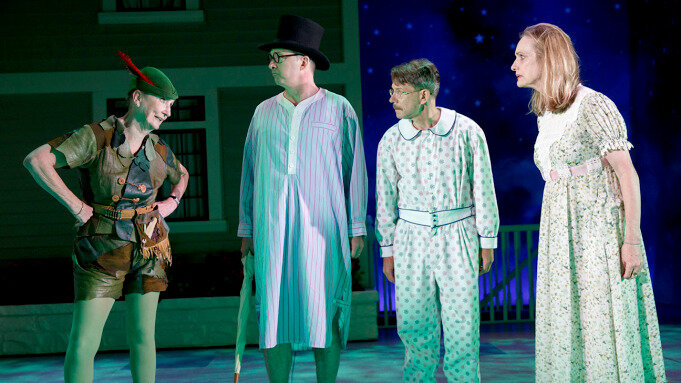Yearning for Neverland in ‘For Peter Pan on her 70th birthday’
Photo by Joan Marcus
Originally published on The Culture Trip
View this story online
The program notes state that Ruhl wrote For Peter Pan on her 70th birthday as a gift to her mother, Katherine, who played Peter Pan as a teenager in Davenport, Iowa. The 90-minute meditation on aging and maturity — in other words, “growing up” — is obviously near and dear to the playwright’s heart. Perhaps a little too near.
Drama and whimsy
Ruhl’s play, making its New York premiere Off-Broadway at Playwrights Horizons under Les Waters’ direction, presents the fusion of everyday drama and whimsy the playwright has so often staged, blending day-to-day concerns with the bittersweet and mystical.

Photo by Joan Marcus
The show opens with Ann, played by an exquisite Kathleen Chalfant, fondly reminiscing about playing Peter Pan in a local theater production when she was young, then moves to a hospital room filled with tension and life support, where five siblings have gathered to witness the passing of their father, George (Ron Crawford). While waiting for the inevitable, and torn between fear and guilt, they begin agonizing over their own mortality, alternating between small talk and emotional debates on euthanasia.
Impromptu wake
While intellectually engaging, the scene offers little character development and invites even less emotional investment. The familiar ways in which the siblings converse with each other do little for the audience, a problem further perpetuated at the impromptu wake they hold for their father around their dining room table.

Photo by Joan Marcus
Alongside generous pours of Jameson whiskey, heated debates on politics and religion are interspersed with affectionate memories of their father — who is seen walking through the house, unnoticed by his children. Chalfant’s Ann, the eldest, is a liberal professor with a PhD in rhetoric, David Chandler is the surgeon Jim, Keith Reddin is the doctor Michael, and Daniel Jenkins is the college professor John.
Lisa Emery is a standout as Wendy, the youngest sister and the most devoted to her religious beliefs.In between bursts of laughter and somber reflection, the quintet — each member is over 50 — ponders when, and if, they grew up.
Happy memories
The family is skillfully performed by the ensemble of gifted actors, but as individuals, only Ann and Wendy are truly distinctive.
Chalfant’s performance as Ann is an absolute joy. The veteran stage actress compassionately exposes her character’s various contradictions. Her wisdom, as well as her innocence, which lingers even in her twilight years, are apparent in every word she speaks, also when she silently revisits happy memories of her youth while exploring a box containing — guess what? — her Peter Pan costume. Watching Chalfant put on the iconic green hat and tunic is easily the most moving moment in the play.
Sadly, the same cannot be said of the scene that follows. It seemed inevitable that, following Ann’s donning of her Peter Pan costume, J.M. Barrie’s play would itself be revisited. Kristopher Castle’s costumes and Matt Frey’s lighting, along with Bray Poor and Charles Coes’ music and sound, create a Neverland that is fun to visit for a few minutes, but one would not want to remain there indefinitely.
Enter Hook
With Ann playing Peter and Wendy, Michael, and John playing their namesakes, the quartet depart their nursery, designed with affectionate nostalgia by David Zinn,and attempt to fly back to Neverland. When that fails, they walk — and encounter Captain Hook, played with gleeful flamboyance by Chandler. A battle ensues, during which beloved lines from the play are mixed with barbs about ageing.
At one point, Wendy tells Peter he would have benefited from Jungian analysis and reminds him that she has arthritis and that he has gout—to mixed effect. Laughter is inevitable when an audience sees a grown man dressed in footie pajamas, and the script contains moments of true Ruhl wit and sparkle, but others are merely embarrassing.

Photo by Joan Marcus
The inescapable departure of the Darlings — each of them listing the people and responsibilities that await then in the real world — does not resonate as bittersweetly or somberly as it should.
Mixed results
Seeing the septuagenarian Ann as a gleefully crowing Peter is a true delight, and reflecting on longing for lost youth and possibility naturally invokes melancholy. But the lack of external conflict in For Peter Pan is a detriment to the play, which, however charming its cast and execution, stalls and lags.
It’s unclear what Ruhl’s intention for the play was, other than to pay loving homage to her family’s history. If that was the only goal, she has succeeded. But there are more than just members of her family sitting in the audience.

